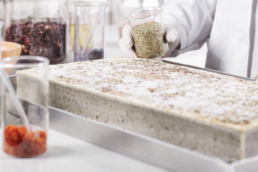Smart Vertical Farms in Korea have been springing up lately. Even before COVID-19, smart vertical farms were being installed around Korea. Smart vertical farms produce foods in vertically stacked layers commonly integrated into structures like buildings, shipping containers, or repurposed warehouses. These farms grow plants that do not need sunlight or soil. It is “Smart” because the process is automated. For example, the artificial control of temperature, light, humidity, and gases makes producing food indoors possible. Think of them as smart greenhouses where metal reflectors and artificial lighting augment natural sunlight. Ultimately, vertical farms aim to maximize crop output in a limited space which is perfect for Seoul.
Korean startups N.Thing, NEXTON, Farm 8, and more are becoming vertical farming leaders in South Korea. They aim to provide fresh, sustainable, local food all year round. Seoul is one of the biggest cities in Asia, and it is slowly becoming a food desert. Access to fresh, healthy food is a challenge. At its essence, vertical farming enables local food production at scale.
The vertical farms made by N.Thing, NEXTON, Farm 8, and other vertical farms can grow plants using 90% less water than traditional farming. More importantly, they can grow without pesticides, herbicides, and fungicides while having a great fresh taste. These smart vertical farms grow plants using hydroponics, LED light, and algae as a growth medium. Therefore they can shorten the growth cycle to half the time vs. traditional farming. In addition, they use vertically stacked beds which produce more products per square footage.
NEXTON Creates Vertical Farms in Korea Under a Mountain

A smart vertical farm has been built under a mountain in South Korea. It is inside an abandoned tunnel once used as a highway tunnel. The tunnel (600 meters in length) is used to grow fruits and vegetables. In addition to LED lights, NEXTON also plays classical music to encourage their plants to grow. Studies show that food produced from vertical indoor farms is safer and more nutritious. The farm is separated from natural pollution, pests, and pesticides that traditional farms have to deal with. In addition, these vertical farms have constant temperatures, so there is little need for cooling/heating. As technology improves, vertical farms can grow a broader range of fruits and vegetables.
“The world’s population is only going to grow but the environment is only getting worse to grow various vegetables, so I think vertical farms will be the only alternative to provide healthy food to our table in the future,” said the CEO of NEXTON.
Guaranteed Food Security in Korea
These vertical farms could be a great source of food if any issues come with outdoor farming. What COVID-19 has taught us is that anything can happen. Food distribution in Korea has many avenues for contamination. It is estimated that produce exchanges between 4 different hands before it arrives at a local grocery store in Korea. Because of the amount of space these vertical farms take up, the volume that can be produced has vast potential. An average vertical farm has the potential to grow over 2,000 lettuce romaine heads in under a month. In addition, vertical farming takes the uncertainty of pests, the quality of soil, amount of sunlight and makes them controllable through AI technology.
Farm 8 Creates Vertical Farms in Korea for Subway Stations

A Seoul subway station near Sangdo now has a vertical farm thanks to Korean startup Farm 8. As Farm 8 has partnered with the Seoul government, more are on the way. They grow eight types of vegetables. Trays of hydroponics composed of algae, water, and nutrients are used to produce the plants. In addition, the vertical farm has a filtration system to keep Seoul’s fine dust particles out of the farm. Therefore vegetables have higher amounts of vitamins and minerals than regular vegetables.
The vertical farm (400-square meters in length) is divided into four separate zones.
The 4 Zones:
- Main facility – Placement of the vertically stacked farms.
- The secondary facility is smaller than the main facility and is inside a shipping container.
- An education space – The space to educate children. In addition, there is a classroom that offers puzzles, stickers, and workbooks that teach about the benefits of having a balanced diet.
- Produce Store – This will be an outlet where consumers can buy and consume different salad dishes on-site. They offer a salad bar and different types of healthy juices as well.
Farm 8 is in partnership with 70 farms in Korea. They sell close to 40 tons of packaged salads per day. Some of their clients include Starbucks and GS25, Korea’s leading convenience store chain. Therefore they offer their products to the Korean market and their vertical farm hardware to the global market. They offer vertical farms of all sizes, from refrigerator-sized to 40-foot containers. These container farms cost $130,000.
Smart Hydroponic Farm by n.thing
 AgriTech IoT startup n.thing is the developer of CUBE, a vertical farm that uses technology to cultivate high-quality vegetables in a fully controlled environment. Clients can add more cubes as needed to increase their farming production. The smart hydropic farm called CUBE is shaped like a shipping container. A computerized system controls the interior environment. Therefore plants can grow without the help of humans.
AgriTech IoT startup n.thing is the developer of CUBE, a vertical farm that uses technology to cultivate high-quality vegetables in a fully controlled environment. Clients can add more cubes as needed to increase their farming production. The smart hydropic farm called CUBE is shaped like a shipping container. A computerized system controls the interior environment. Therefore plants can grow without the help of humans.
CUBE uses special LED lights that help with the photosynthesis of the plants and internet-connected sensors. CUBE allows year-round farming with consistent quality and no price fluctuation. The interior system within CUBE controls the humidity and temperature and protects against pests. In addition, the system collects the farming logs into a database to offer the best growth information for each crop. Clients can easily manage their vertical farms through the data collected. Therefore the CUBE operating system lets users maintain their farms anywhere and at any time. Those who need a steady supply of food can now produce their supply of fresh vegetables with CUBE.
Partnership with Emart
N.Thing plans to expand its product lines and its technology platform in Korea. They work with Emart, the largest retailer in South Korea, to distribute crops through vertical farm units.
ALGA Farmtech – Smart Vertical Farms

Vertical Smart Farm startup ALGA Farmtech develops and operates a plant factory system based on ultra-dense cultivation (UHDC) technology. They can produce three times the productivity per unit compared to existing vertical farms. Moreover, they recently completed a 40,000-port vertical farm facility in Anseong, Gyeonggi-do, which can supply 7 tons of vegetables per month.
“We have secured original technology and related patents through continuous investment in R&D, and we are directly operating a smart farm vertical farm and accumulating system improvement and know-how,” said the CEO of ALGA Farmtech, Cho Han-mok.
FIRMMIT

FIRMMIT provides total solutions for smart farming, from selecting crops, designing the facilities, and delivering the final products to buyers. They operate direct farms nationwide that apply only their technology. Therefore they can optimize growth data by securing and analyzing agricultural technology data accumulated in 127 locations in Korea. Its goal is to operate in 15 countries and open 30 branches worldwide by 2025. FIRMMIT signed a contract with Korea’s top beer and soju maker HiteJinro back in 2021.
The Future of Vertical Farming in Korea
The agriculture industry is now using technology and data more than ever before. Vertical farms are the best example of how the industry uses the latest technologies. Soon these vertical farms will be able to work with data companies to analyze millions of data points, allowing for unprecedented control over the plants they grow. Plants are manipulated by different types of lighting, temperatures, and water. This brings out different colors and even flavors from the plants. These vertical farms can not only grow leafy greens but also fruits and vegetables.
The key moving forward will be to create interconnected devices that can process the data in real time. Therefore, these vertical farm startups in Korea will need to partner with the right data company because data and technology are the future of all agriculture. The next generation is to go global and potentially feed the world globally.
John
John is the Co-Founder of Seoulz. He has covered the Korean startup & tech scene for over eight years and has written over 700 articles regarding the Korean startup ecosystem. He has brought global attention to Korea's tech scene using Google SEO. Email him at john@seoulz.com
Related Posts
The Future of UK-South Korea Relations
February 17, 2023
Genetics Startups in Korea Changing the Future of Healthcare
February 7, 2024






